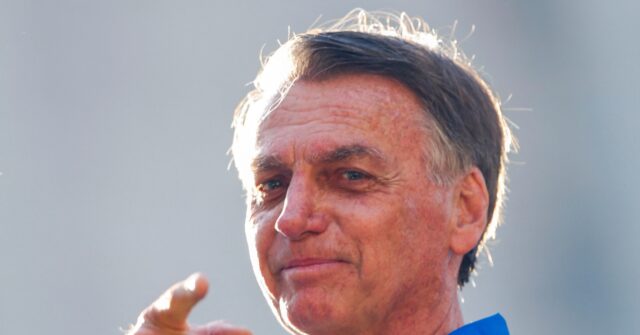A nationwide poll published in Brazil this week found former President Jair Bolsonaro may have the best chance to defeat incumbent socialist Luiz Inácio Lula da Silva in the 2026 presidential election – even though he is banned from running for any office through 2030.
The poll, conducted by Paraná Pesquisas, studied hypothetical two-person races pitting Lula, who would be running for a fourth term in office, against several conservative potential candidates. Bolsonaro’s wife, former first lady Michelle Bolsonaro, was among them, as well as the governor of Sao Paulo, Tarcísio de Freitas, and the leader of the Congressional opposition, Rogério Marinho. Three of the four matchups would result in statistical ties – wins for the conservatives within the poll’s margin of error – while Lula would defeat Marinho in a potential matchup.
Brazil’s presidential election takes place within a two-round system. A candidate must receive over 50 percent of the vote in the first round to be elected president; if they do not, the top two candidates in the first round move on to a runoff election. During the last election, the then-incumbent Bolsonaro narrowly lost to Lula in both the first round and the runoff election.
The close results of the election and the heavy intervention by the nation’s Superior Electoral Tribunal (TSE) to ban mention of Lula’s various corruption convictions and imprisonment led to widespread concerns that the election was neither free nor fair. Bolsonaro supporters went on to stage a spontaneous riot during a protest against the way the election was handled on January 8, 2023, that has since formed the basis for the extended prosecution of Bolsonaro on dubious charges of attempting to stage a coup d’etat.
Bolsonaro has faced at least four criminal cases since losing the election at the hands of leftist-controlled courts, the most serious of which is the case on charges of allegedly staging a failed coup. The Lula government has also banned Bolsonaro from running for office through 2030, calling him a threat to democracy.
Despite these limitations, the polling firm Paraná Pesquisas found that 44.4 percent of respondents would vote for Bolsonaro, while 41.5 percent would vote for Lula in a hypothetical match-up. The results were, as expected, narrower for the first round of the election featuring other candidates. The poll found that Bolsonaro would win a hypothetical first round with 35.2 percent support compared to 34.8 percent for Lula. Ciro Gomes of the Democratic Labor Party would come in third with 7.9 percent of the vote, while the governor of Paraná, Ratinho Júnior, came in fourth.
In a hypothetical second round, the poll established a 2.2-percent margin of error. Former First Lady Michelle Bolsonaro would attract 43.4 percent support to Lula’s 42.3 percent support, while Tarcísio, considered a likely successor to Bolsonaro as conservative movement leader despite belonging to a different political party, would exactly tie Lula 41.9 to 41.9 percent. Marinho, the lawmaker, received 37.8 percent support from respondents, compared to 42.9 percent for Lula.
The poll was conducted between August 17 and 21, following major international consequences for Brazil from the Bolsonaro case. In the United States, President Donald Trump, who has described Bolsonaro as a personal friend, repeatedly condemned his prosecution and compared it to his own legal woes prior to winning the 2024 presidential election. Trump signed an executive order in July that declared the Lula government a national security threat, hiked tariffs up to 50 percent for Brazilian products, and sanctioned Alexandre de Moraes, the most powerful justice on Brazil’s top court, for his role in persecuting the former president.
Bolsonaro’s lead over Lula narrowed between August and a Paraná Pesquisas poll released in April, which found Bolsonaro would defeat the incumbent by 46 percent of the vote, compared to Lula’s 40.4 percent. While Bolsonaro was already banned at the time from running for office, his legal situation as become more complicated as the Lula government and the Supreme Federal Tribunal (STF), the top Brazilian court, have increased their actions against Bolsonaro in response to Trump’s sanctions. De Moraes ordered Bolsonaro to wear an ankle monitor and barred him from using social media, among other limitations. De Moraes ordered the former president under a full house arrest in August in response to him sending a message to a peaceful rally in his support via video link at the beginning of the month, which the judge claimed was a violation in spirit of the ban from social media.
The rallies that outraged de Moraes occurred in 62 cities around the world and attracted thousands of conservatives calling for freedom for Bolsonaro and condemning the Lula administration, as well as the supreme court.
A report by the magazine Veja, citing anonymous sources, claimed on Sunday that top conservative leaders in the country are privately engaging Bolsonaro during house arrest for his assessments on who the strongest performing candidates in 2026 could be. Veja identified Tarcísio, the governor of Sao Paulo, and Paraná governor Ratinho Junior as likely top prospects.
Follow Frances Martel on Facebook and Twitter.
Read the full article here


